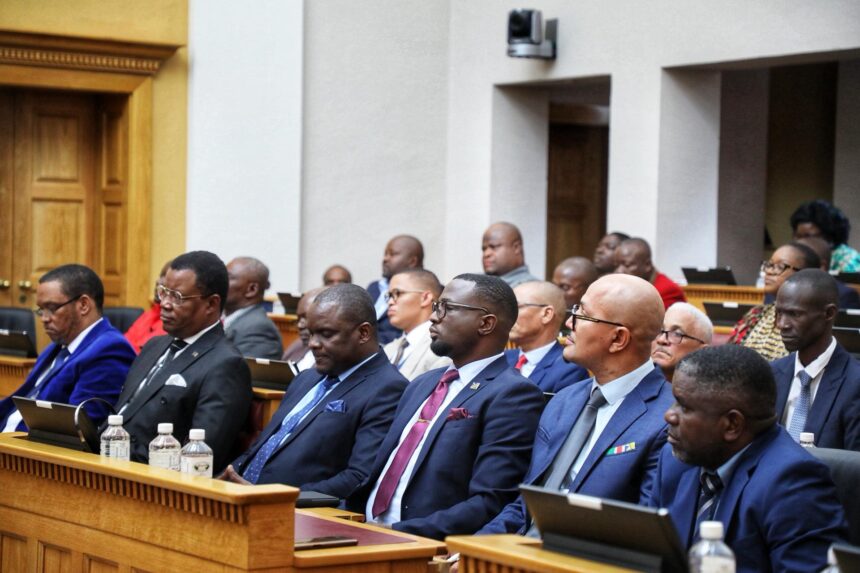No access to land, continued agricultural sector underfunding, lack of financing for businesses and the conclusion of the protracted genocide talks were some of the key issues raised by opposition parties yesterday.
While collectively congratulating and extending their support, they vowed to hold the nation’s leader accountable for the next five years, for if her administration succeeds, it is a win for Namibia.
The politicians made their demands known during President Netumbo Nandi-Ndaitwah’s maiden State of the Nation Address (SONA) to Parliament yesterday.
The SONA marks a joint sitting of the country’s National Assembly and National Council, officially setting the tone for the government’s development agenda.
Poverty
During the question-and-answer session, Affirmative Repositioning (AR) leader Job Amupanda pressed Nandi-Ndaitwah on the skyrocketing levels of poverty, inequality and unemployment, saying as much as he appreciates the various interventions proposed by the President in her speech, some of her set goals appear unrealistic.
The high import of basic goods and needs, such as boots and uniforms, particularly for the country’s uniformed personnel such as the army, police and others, was another concern he raised, saying the time is ripe for the government to set up local manufacturing capacity to lower the imports. “We must actively get involved as a State in the economy. Our footwear or shoe imports surpass more than five million pairs per year, costing more than N$700 million. Our mining industry alone employs more than 18 000 people, the police have 10 000 members, and our defence has more than 10 000 members. These three categories alone take us to close to 50 000. If each of these employees or members require two pairs per year, then 100,000 pairs are required annually. At present, all these pairs are imported”, Amupanda stated.
The youthful lawmaker also touched on tertiary education, which Nandi-Ndaitwah said will be free, effective next year. Although he appreciates the President’s effort and decision to make tertiary education accessible to all Namibians, it is not clear how the government will fund it, and what the infrastructure expansion plan is. “If the 500 000 employed Namibians each contribute N$50.00 and their employers do the same, we will have N$50 million per month and N$600 million per year. If this fund is left untouched during a two-year inception period, it will be about N$2 billion. The State can contribute N$5 billion to the fund during the same inception period. In the third year, we will be able to provide free education to our children. We can demonstrate further details on this model, if necessary. All it requires is a law. When passed, the econometrics will follow,” he advised.
AgriBank, NamRA thorns
In his intervention, Landless People’s Movement leader and chief change campaigner Bernadus Swartbooi took issue with State institutions which were created with bona fide motives, but are somewhat yielding regressive results.
He pointed to the Namibia Revenue Agency (NamRA) and the Agriculture Bank of Namibia (AgriBank).
“While access to land remains a challenge to many in this country, particularly to Black farmers, Agribank is on the other hand repossessing land left, right and centre from farmers who are already struggling. This bank [Agribank] has become an instrument of oppression for most farmers. It must be reformed so that it starts speaking to the needs and aspirations of Namibian farmers. Save Black farmers, and implement Parliament’s decisions to reduce taxes and rates. In its current state, AgriBank is no longer an affirmative bank as it was initially intended,” he charged.
Demanding speedy implementation, accountability and urgency from Nandi-Ndaitwah, Swartbooi called on the President to prioritise tackling key and pressing issues, rather than trying to aimlessly address all issues in one go with no clear intent.
“Madam President, your government is everywhere, and therefore it will be nowhere. We don’t hear your statement landing somewhere. Hage Geingob’s government landed somewhere with old-age pension grants – got a low-hanging fruit, and landed it somewhere. There was impact because he was aiming at low-hanging fruit. I’m hearing N$700 million for the formalisation of informal settlements, and therefore you are throwing peanuts at all problems, and you will not be able to address any problem, Your Excellency,” he stated.
Leader of the official opposition party Independent Patriots for Change (IPC) Imms Nashinge observed that Nandi-Ndaitwah’s speech was too ambitious and lacked a clear strategy as to how she would deliver on all her promises.
“This sounds promising, but we are used to weak implementation. We hope this time it will be different,” he said.
Tactics
Popular Democratic Movement (PDM) leader McHenry Venaani commended the development agenda being outlined by Nandi-Ndaitwah, but called for tactical and strategic alignment with the needs and aspirations of Namibians.
“Good that you have declared free tertiary education from next year, and that means we would have educated our youth, but where are the jobs? Agriculture and the value chains must be prioritised as well. The government spends more on security than on food production, and I have a serious problem with that. Our needs and priorities must align”, he observed.
On the genocide issue, he proposed an international dialogue in Namibia to find a common strategy.


